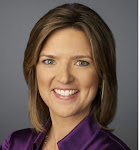From September's Men's Journal:
CNN's Rob Marciano, the Storm King
Most weathermen stand in front of a green screen pointing at cartoon suns. Not Rob Marciano. He's the guy standing on shore while palm trees blow sideways during a hurricane. An award-winning reporter, Marciano thrives in the field, talking with storm victims and putting human faces to disasters. "It's a more multifaceted experience than people imagine," the 44-year-old says. "In a studio, you get disconnected and forget what the weather actually feels like, how it's affecting people's lives."
What's the craziest weather event you've seen while reporting?
Hurricane Katrina. I was in Biloxi, Mississippi, right on the eyewall, when it came ashore in Florida. The hotel where we were based was being torn apart by the winds. Eventually, we had to find other shelter. Obviously, that pales in comparison to what happened when it hit New Orleans. I remember seeing the satellite picture on TV when I landed there – it was a monster. I still get chills thinking about it.
You've covered wildfires out West, too.
On TV, all you see is flames crawling up a tree. But when you're near it, that heat is hard to describe. It's like walking into a glassblowing shop – if you get close to that furnace, you're thrown back. Imagine that, tenfold. Cast iron and glass melt on the road.
Over your nine years on CNN, you've done a lot of adventurous segments unrelated to weather – jumping out of airplanes, driving race cars. Why?
I'll do just about anything. When they're like, "Who's willing to do this?" someone always says, "Rob will." I like to bring the viewer into an experience – I want them to feel what I feel.
You're also a dedicated storm chaser. Ever gotten close?
This spring, I finally had success. I was on a single-lane dirt road in Oklahoma, doing 70 in a rented Chevy Impala with a seasoned storm chaser in the back. All of a sudden, he starts screaming: "Oh, yeah, there it is, baby! We're gonna see a massive tornado today!" We raced to meet it on a diagonal, and as we got closer, the funnel started to lower. That's where my heart dropped. I hit the brakes, pulled over, and the funnel dropped. We jumped out and just started taking it all in. Then a second tornado formed to the east. It was unreal. We were going bananas, jumping around like little kids. It was the thrill of a lifetime.
Why did you decide to go into meteorology?
Growing up in Connecticut, I knew if it snowed, they'd cancel school, and I wouldn't have to do my homework. So I'd watch every weather person in the market. That's how I got into the science. But what kid doesn't love snowstorms? I can remember lying in the snow, watching clouds move and snowflakes come down, and being enthralled by nature. By eighth grade, it dawned on me that was what I wanted to do.
Two winters ago, the East Coast was buried in snow. Last year, the West Coast stayed dry through ski season. Is this the effect of global warming?
We're starting to see the weather get more extreme, but we can't pin it on climate change yet. We do know that when the globe warms, the poles warm the most. That makes for less of a temperature difference between the equator and the poles, which creates a weaker jet stream. That, in turn, means we get stuck in weather patterns.
Is the weather going to get more extreme every year?
That's beyond my pay grade: I'm a meteorologist, not a climatologist. Climate is what you expect to get; weather is what you actually get. But my colleagues and I are seeing earlier spring, earlier snowmelt, and tornadoes farther north and earlier in the season.
Where do you stand personally in the global warming argument?
The science says the world is warming. And it's done so at such an accelerated rate in the Industrial Age, there's no denying man has had something to do with it. The question is, how much? The Earth's ecosystem is very complex, and there are no easy answers. That's the fascinating and, at the same time, scary part.
Do you have an obligation to sound the alarm about climate change?
This is something weathermen struggle with all the time. The consensus is that we need to present the facts as we know them and point viewers in the direction the science is heading. But as an environmentalist and an outdoorsman, I implore people to recycle and decrease their carbon footprint.
Right after college, you worked on Wall Street. Ever tempted to go back and trade weather futures?
That certainly would be putting my money where my mouth is, right? I like to think I'm doing the public a greater good by telling people what their kids should wear to school. That's a safer bet.



















































1 comment:
Why am I not surprised he wanted to avoid doing homework? He sure is cute though.
Post a Comment